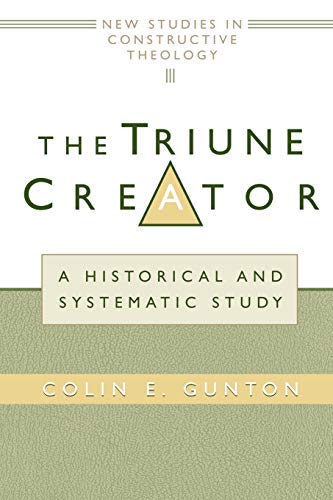“I believe in God the Father, maker of Heaven and Earth.” You must have confessed or heard others confess this statement of faith from the Apostles’ Creed. But is there anything more to it than just being a statement of faith that needs to recited every now and then? In his book The Triune Creator: A Historical and Systematic Study, Colin Gunton argues that this faith statement makes several presuppositions about God and the world God has created that have shaped our understanding (or largely Western understanding) of the natural world. The radical force behind these presuppositions not only unshackled the Western world from the chains of Greek metaphysics in its early stages to eventually become what it is today, but also if realised they can heal the Western world today from what is ailing it – individualism, reductionism, materialism, matter-spirit duality and more. In all these, the central problem that ails the West is ‘relationality’ (to simplify, being or not being properly related). As the subtitle suggests, Gunton’s approach is both historic and systematic – one can say that generally he takes the historical route when explaining the doctrine of creation, while being systematic in his critique.
The presuppositions mentioned above are explained in the first chapter of the book. These are: 1). God as creator is neither self-evident or a discovery of disinterested reason, but an act of revelation; 2). God is not maker in that he employs the pre-existing material, but creator of everything; 3). Creation was a trinitarian act (here Gunton mostly borrows from Ireneaus, whom he admires most); 4). Since trinitarian, God is continuously involved in creation; 5). The doctrine of creation is interconnected with the doctrine of redemption; 6). Doctrine of creation gives special place to humankind in its scheme; 7). There is an ethical dimension to the doctrine of creation. Thus for Gunton these presuppositions are all closely joined with one another, forming a mosaic that is the Christian doctrine of creation.
In the remaining chapters, which can be divided into three parts, Gunton unpacks these themes and shows their kinship. In the first and the longest part (from chapters 2-6), Gunton sketches the history of the beliefs about nature from church fathers to Immanuel Kant. Central to the historical sketch is Gunton’s argument that the doctrine of triune creator, most clearly evident in Irenaeus’ vision of God relating with creation with his two hands (the Son and the Spirit), provides a properly Christian framework of relationality that avoids the pitfalls of other such systems that either tie God and world too closely or untie them completely, such as pantheism, gnosticism, platonism, Aristetolianism and deism. Creatio ex nihilo, for Gunton, is one such doctrine, a fruit of the relational understanding of God that set Him free from the necessity to create, on the one hand (since matter is not part of God, God is free and willing to create), and set the world free from its low status, from its slavery to fate and declared it to be good (since it is creation of a good God), on the other. In doing this, the doctrine provided just sufficient space for creation to be both free and (relatively) independent, so that it can prosper and even be studied, thus paving the way for the emergence of modern science. But history from church fathers to Immanuel Kant reveals a tug-of-war between Greek ontologies and Christian doctrine of triune creation – with thinkers such as Augustine, Aquinas, Kant and Hegel on the side of the former, while Irenaeus,William of Ockham, Luther and Calvin, on the latter.
In the second part, chapters 7 and 8, Gunton attempts to recover the doctrine of triune creation for contemporary times, engaging much with Barth, Pannenberg and Moltmann. He takes the priority of revelation from Barth, but also explores the past and future of creation. For Gunton, like for Irenaeus, creation is a project of God, in which incarnation (life, death and resurrection of Christ) provides a structure for the redemption and destiny of the material world, while the Spirit, working from within the world and the boundary of this structure, leads creation to an eschatological end. Thus doctrines such as that of sin and the providence of God only make sense only when understood as part of the way in which this triune God relates to the world in creation, preservation, incarnation and in leading it to its telos.
Creatio ex nihilo, for Gunton, is one such doctrine, a fruit of the relational understanding of God that set Him free from the necessity to create, on the one hand (since matter is not part of God, God is free and willing to create), and set the world free from its low status, from its slavery to fate and declared it to be good (since it is creation of a good God), on the other.
In the last part (chapters 9 and 10), Gunton turns to ethics that his trinitarian theology can provide. Here he returns to the classical notions of the image of God and the Christian eschatology that become catalysts for ethical living – because both relate us to creation in certain ways.
Historical density in Gunton’s work does not make it an easy read for everyone. It also raises questions that demand further exploration, such as: if creation has its telos determined, is it really free? What is the role of the Holy Spirit in creation? What about natural theology? Considering that the question of evil is such an acute issue for the doctrine of creation, it feels odd that Gunton gives a rather small place to it.
Despite these limitations, The Triune Creator provides a helpful third way to construe God-world relation that saves it from the dual dangers of aligning nature too closely to God or sawing it altogether from God, and thus provides a true foundation of relationality. But is this work related to the context of South Asia? If you believe (as I do) that relationality is a plaguing issue for us in South Asia as much as it is in the West (though differently), Gunton’s work is certainly a relevant and valuable contribution.






